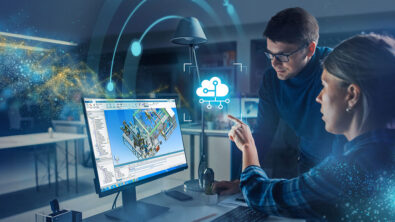Sustainability provides a holistic viewpoint for industrial machinery

In revisiting our sustainability podcast series, the first two episodes focused on how companies explore sustainability and the obstacles standing in their way. It outlined how to address these challenges and discover how a digitalization strategy can help you achieve the sustainability demands of tomorrow.

In this podcast episode, we continue the sustainability theme, pivoting our discussion to the industrial machinery industry. We join our resident experts Erin Devola, Head of Sustainability at Siemens Digital Industries Software, and Rahul Garg, VP of Industrial Machinery and SMB Business Program at Siemens Digital Industries Software.

Erin is a mechanical engineer with over 20 years in the industry with experience in diverse roles in quality, reliability, and test engineering. She has been with Siemens for over 12 years, working in multiple areas of their portfolio. Her current role is Head of Sustainability. Rahul has an electrical computer engineering background and has been involved with the design and development of software for the last 30 years, leading three startups.
The entire topic of sustainability is exciting as it promotes innovative thinking yet to be part of many industries and companies’ core analysis and design.
The need for a sustainable business strategy drives the following four trends in the industrial machinery industry:
- Regulatory and government bodies drive the commitments, reporting, and compliance.
- Capital flow of money is investing in driving smarter, sustainable factories.
- Social aspects of resource scarcity are prompting the need for sustainability practices.
- Customer demand is driving equipment providers to make equipment more sustainable.
These drivers are dynamic, constantly changing the view of sustainability and moving towards changing business strategies. When we view these trends through the lens of industrial machinery, electrification drives the need for efficiency; however, these processes require energy density that is currently only available in fossil fuels but not electricity. Subsequently, there’s a need to convert, evaluate and optimize materials.
Digitalization makes sustainability happen
When gauging emissions in energy consumption from fossil fuels, the defining sum is energy cost – a significant driver for optimizing the cost point.
Sustainability requires planning and tools to make it happen. Digitalization is a pivotal lever to provide the opportunity to view the entire product lifecycle, retrieving data from various phases and visualizing it by running it through simulation tools via digitalization to exchange data.
Digitalization also helps a digital enterprise to become more adaptable, agile, and flexible, improving the ability to deliver a product one time, with quality, at a lower cost, to leverage digitalization for energy efficiency, decarbonization circularity, and resource efficiency. So, it unites all these aspects comprehensively for customers – an evolution. Digitalization provides the tools to make it palatable and executable.
Because complexity increases potential outcomes, digital tools enable better manageability. Furthermore, the whole value chain can be viewed where all entities work cohesively toward finding pain points universally and holistically.
The beauty of having a safe, secure data exchange while visualizing it across an entity and product’s lifecycle, production line, or facility is invaluable.
When looking for the best way to optimize your design process using digitalization tools, you’re viewing suppliers for both the cost and the carbon footprint of the part and its delivery to your location by the supplier.
Leveraging digitalization for sustainability
Designing no longer requires creating a machine for the highest possible throughput or quality. Still, designing for energy efficiency and circularity is essential – making it easy to remanufacture and refurbish a machine to extend its life.
Manufacturing machines include sustainability. It is essential to evaluate how suppliers will provide parts machines and the sustainability of their efforts in part production, and measuring the sustainability impact of operating machines, especially when the highest energy consumption impacts occur.
Note: The carbon footprint impacts a machine’s life and longevity, ranging from six months to 60 years.
Learn more in the podcast or transcript.
Siemens Digital Industries Software helps organizations of all sizes digitally transform using software, hardware and services from the Siemens Xcelerator business platform. Siemens’ software and the comprehensive digital twin enable companies to optimize their design, engineering and manufacturing processes to turn today’s ideas into the sustainable products of the future. From chips to entire systems, from product to process, across all industries. Siemens Digital Industries Software – Accelerating transformation.


